Oct 1, 2025 – Washington D.C. Day 3, North American Lecture Tour (5) Johns Hopkins University, Baltimore
Hello. Morning has dawned at the US Jungto Center. Today marks the third day of Sunim’s visit to Washington D.C. Sunim visited the U.S. State Department to discuss improving North Korea-U.S. relations and gave a Dharma Q&A lecture with English interpretation at Johns Hopkins University in Baltimore.
After morning practice and meditation at 5 AM, Sunim had breakfast. Today was scheduled for a meeting at the U.S. State Department, but the U.S. government shutdown began at midnight last night. As all government employees entered unpaid leave, communication with the State Department continued from last night to confirm whether the meeting was still possible. Fortunately, they confirmed the meeting would proceed as scheduled, so Sunim departed for the State Department at 9 AM.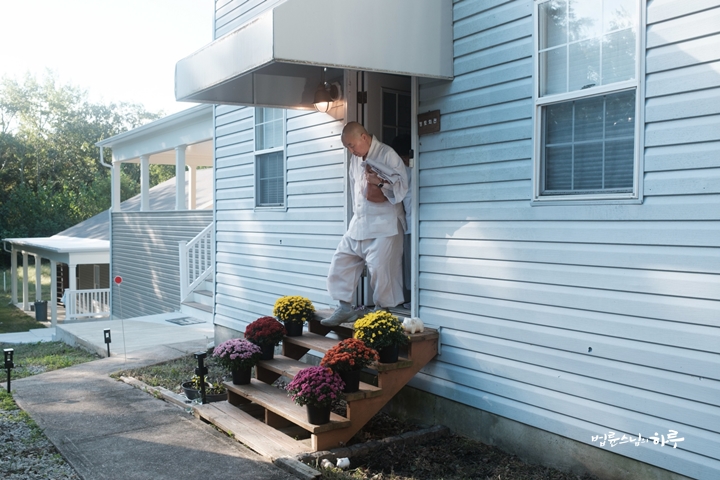
The U.S. federal government entered a partial “shutdown” at 12:01 AM on October 1st. The U.S. government’s fiscal year 2026 runs from October 1, 2025, to September 30, 2026. This shutdown occurred because the fiscal year 2026 budget and temporary budget bills failed to pass Congress by the deadline. This is the first shutdown in 7 years since the 35-day shutdown during Trump’s first term in 2018. Without congressional approval, most federal agencies cannot execute their budgets, and hundreds of thousands of government employees, except those in national security, law enforcement, and essential medical positions, have entered unpaid leave.
Although it was expected that traffic would be light since government employees weren’t commuting, the journey that usually takes about 50 minutes took 1 hour and 10 minutes, arriving just in time. Upon arriving at the State Department building, many people were protesting Israel’s bombing of Gaza in front of the main entrance. While protests are common in front of the White House, protests at the State Department are less frequent. During last May’s visit, there were also protests against the Gaza bombing, but today they were conducting a performance with air raid sirens identical to those actually sounding in Gaza.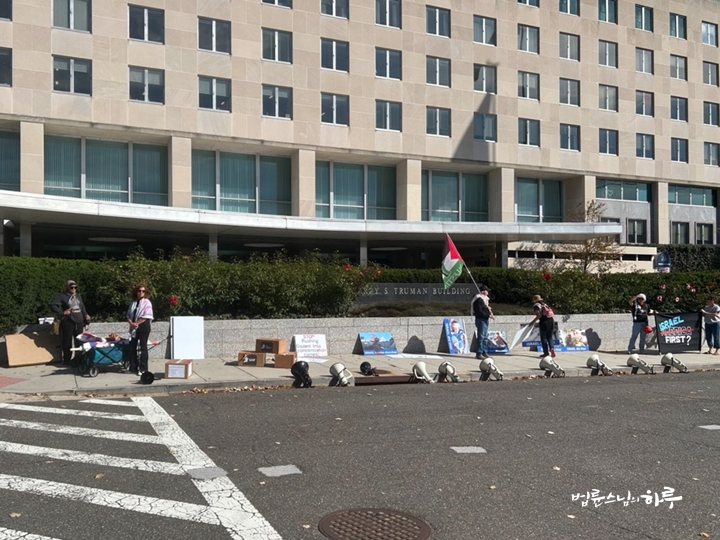
The inside of the State Department building was relatively quiet. A staff member from the State Department’s Korea Desk came out to greet Sunim, thanking him for visiting again. After completing the procedures, they immediately moved to the Bureau of East Asian and Pacific Affairs (EAP).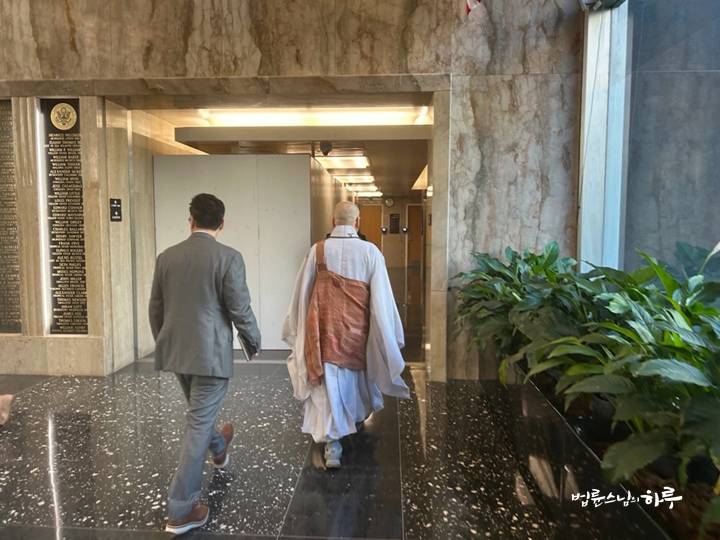
The meeting began with warm greetings in the presence of Acting Deputy Assistant Secretary Seth Bailey and Korea Desk Director Mike Flores, who had assumed his position a month ago. Sunim first conveyed North Korea’s recently stated position.
A Realistic Solution for Peace on the Korean Peninsula: Nuclear Freeze, Not Denuclearization
“Since North Korea has already publicly expressed their intentions, I don’t have much new to add. However, unlike before, North Korea doesn’t seem desperate for dialogue itself. North Korea wants dialogue with the United States, but they’re placing the starting point on normalizing North Korea-U.S. relations, not denuclearization. If the U.S. insists on denuclearization as a precondition and North Korea continues to reject it, the dialogue won’t progress. I think a realistic compromise point between these positions is a nuclear freeze. While denuclearization can be a long-term goal, I believe negotiations could proceed with a nuclear freeze as an intermediary step at this stage.”
Sunim clarified that what North Korea wants is not simply the lifting of economic sanctions.
“North Korea wants relief from military pressure more than the lifting of economic sanctions. To use their expression, it’s like holding a knife to their throat and choking them while asking for dialogue. The knife refers to offensive military exercises using strategic assets, and the choking refers to economic sanctions. In other words, what North Korea is most sensitive to is military exercises and strategic asset deployment, and this could be a major variable in negotiations. A flexible approach is also needed in how to start negotiations. An approach like ‘Since I’m visiting Korea, I heard the Wonsan resort is well-developed, let me stop by and take a look’ could be much easier. It is not necessary to insist on the formal meeting format. Also, it might be possible to have dialogue by proposing improved relations based on the agreements reached at the Singapore summit.”
Finally, Sunim strongly expressed concerns about the possibility of war on the Korean Peninsula.
Only President Trump Can Prevent the Risk of War
“I believe President Trump is the only person who can prevent the risk of war on the Korean Peninsula. Now is that opportunity. 25 million North Korean residents have been suffering for 30 years. The international community has provided humanitarian aid, but it has been very limited.”
Sumin particularly emphasized the suffering of residents inside North Korea, stressing that a greater catastrophe would occur there than in any other region if war broke out.
In response, Acting Deputy Assistant Secretary Seth Bailey listened attentively to Sunim’s views and acknowledged that North Korea is indeed negotiating from a stronger position than before, which could actually be an opportunity for honest dialogue. He emphasized that U.S. goals haven’t changed and that protecting the safety of allies like South Korea and Japan remains the top priority. He stated that military exercises and sanctions are not meant to threaten North Korea but are purely defensive measures. He also mentioned that President Trump might be willing to meet with North Korea again, but emphasized that North Korea should make clear and direct expressions of intent rather than maintaining ambiguous attitudes. They were able to have a deep exchange of views on North Korea’s conditions, U.S. strategy, and humanitarian aid issues for an hour.
During the meeting, Kevin Kim, Senior Bureau Official (SBO) for East Asian and Pacific Affairs at the State Department, whom Sunim had planned to meet, stopped by. He apologized for not being able to meet with Sunim due to his busy schedule. Sunim presented his books as gifts to the three officials overseeing State Department policy for the East Asian and Pacific region.
Sunim inquired with Karen, who is in charge of humanitarian aid to North Korea, about whether it would be better to withdraw the proposal that JTS USA had submitted for humanitarian aid to North Korea. Karen replied that under the current circumstances, it would be better to withdraw the humanitarian aid proposal submitted by JTS USA and resubmit it when the situation improves.
Karen, who accompanied them to the main entrance, said they were also doing their best to improve North Korea-U.S. relations and hoped to deliver good news soon. Sunim expressed his gratitude with a bow.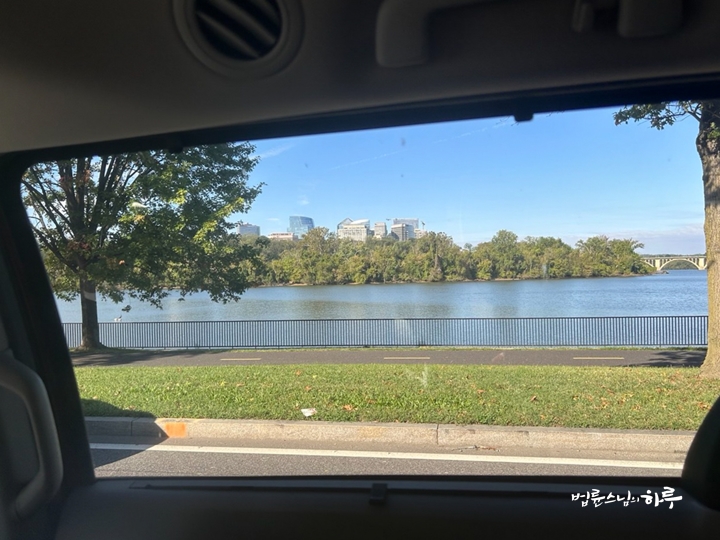
After finishing the State Department meeting and returning to the US Jungto Center, it was 1 PM. After lunch, Sunim spent the afternoon communicating with Korea and handling business matters. At 4 PM, he departed for Baltimore to give a lecture.
Today’s lecture venue was Gilman Hall on the Homewood Campus of Johns Hopkins University. Johns Hopkins University was established in 1876 with the legacy of merchant Johns Hopkins as America’s first research-focused university. It is currently recognized as one of the educational institutions receiving the most research funding in the United States. Sunim had previously visited and lectured at the Johns Hopkins School of Advanced International Studies (SAIS) located in Washington D.C. This was his first visit to the Homewood Campus in Baltimore.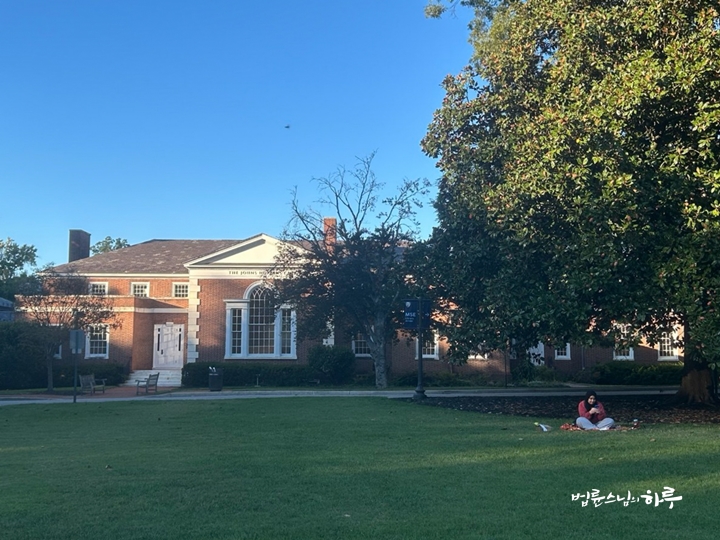
Professor Kim Soo-jung from the Anthropology Department, who organized today’s lecture, first met Venerable Pomnyun Sunim at a Manhattan Dharma Center event during her graduate school days in New York. She is also the author of a book chapter about Venerable Pomnyun Sunim and Jungto Society published in 2021. Last year, she introduced Jungto Society and Venerable Pomnyun Sunim during her seminar class.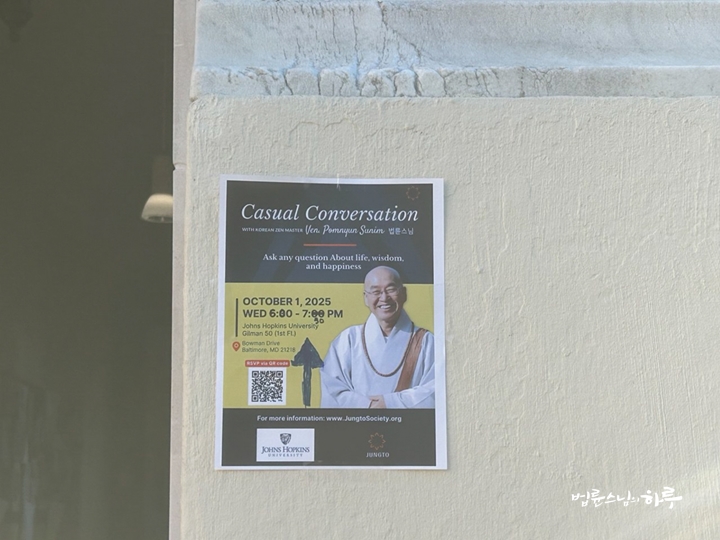
Gilman Hall, the lecture venue, is the most iconic building on the Homewood Campus with a clock tower visible from afar. When Sunim arrived at the lecture hall, volunteers from the International Division warmly welcomed him.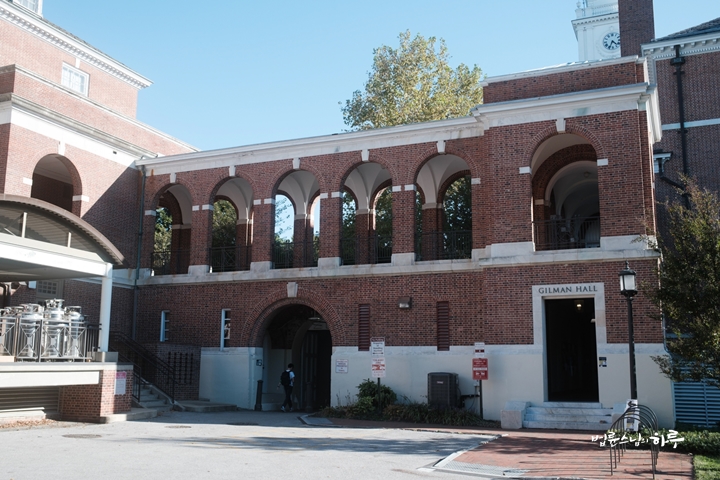
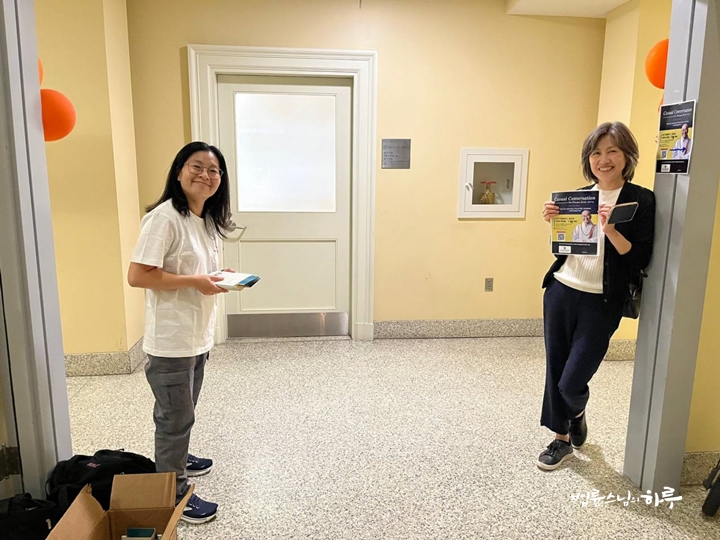
At 6 PM, the lecture began with Professor Kim Soo-jung as the moderator. With about 100 people in attendance, Sunim came up on stage to great applause. Sunim smiled and gave his opening remarks.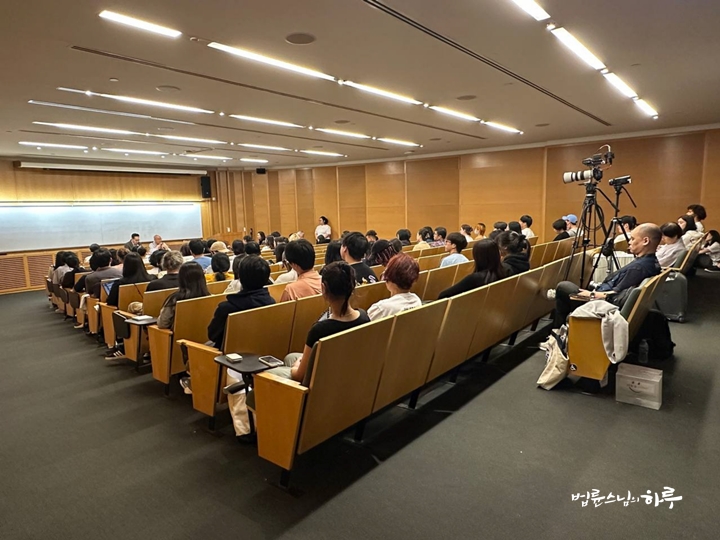
“This is my first time lecturing at Johns Hopkins University. I’ve given several lectures on North Korean issues at the Johns Hopkins School of Advanced International Studies (SAIS) in Washington D.C.
Today, I’d like to have a casual conversation with you without a set topic. You can choose any subject you want and ask questions. As we go through life, we encounter many problems. Sometimes we solve them, sometimes we don’t. We accept some things as natural, while we question others. You can raise questions about these problems you encounter in life, or share your own views. Having a conversation about topics you want to discuss is what Dharma Q&A is all about. So, shall we begin?”
For the next hour and a half, ten people asked questions. One person shared their anxiety about constantly worrying whether they’re really doing their best, asking how to reduce this anxiety.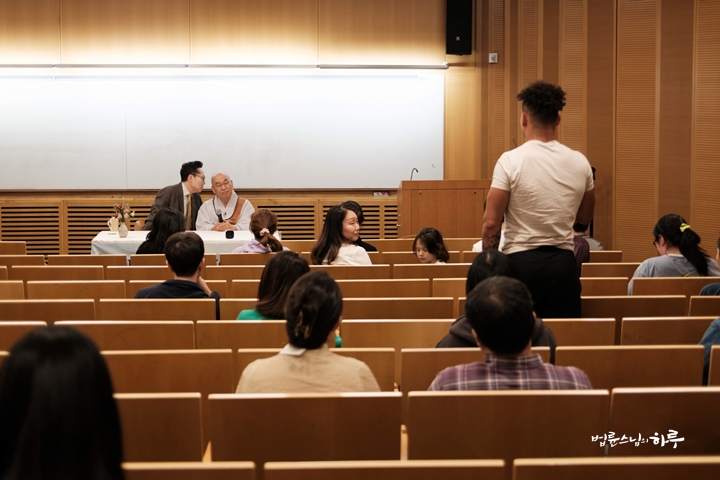
I keep feeling anxious, wondering if I didn’t do my best
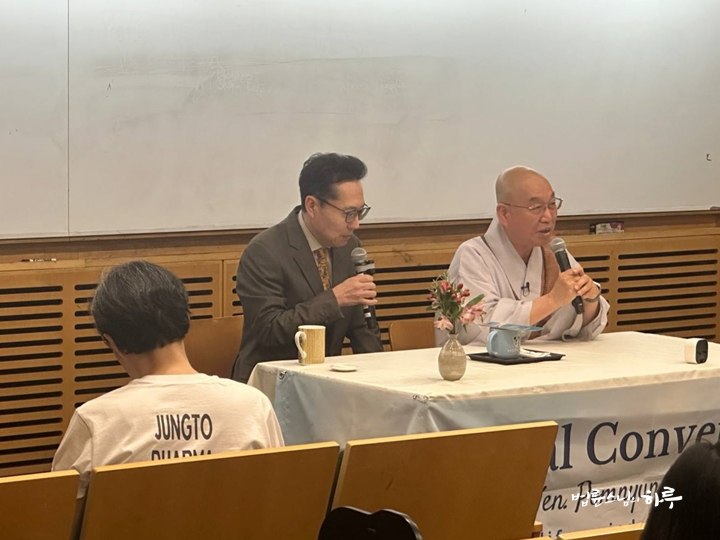
“First, our current life is the result of doing our best moment by moment. Saying you didn’t do your best is just an interpretation based on results. In fact, we are living our lives doing our best every moment.
Second, looking only at results, no one in this world has done their best. Looking back, everyone feels like they could have done more. Just as you feel this way, others feel exactly the same. Since everyone feels they haven’t done their best, your feeling this way is not a problem at all.
In this present moment, we are always doing our best. In a situation where you need to study but also want to date, drink, and go out, you’ve done your best with studying given those circumstances. After time passes, you think ‘How great would it have been if I hadn’t drunk, hadn’t traveled, hadn’t played and just studied?’ That’s why you conclude you didn’t do your best. In this psychological state, there’s a danger of repeating the same pattern, taking the same test over and over after failing. Because you think you didn’t do your best. You think if you do your best next year, it will work. But next year will be the same. Looking back, it will again feel like you didn’t do your best. Because of this danger, if you try once and fail, try once more, and if it still doesn’t work, it’s better to stop. Because what you’re doing under current conditions is already your best.
If you always feel regret about not doing your best after finishing something, it might stem from psychological anxiety or perfectionist tendencies. In some cases, treatment might be necessary. Many students endure these mental difficulties, causing symptoms to worsen. If your mental state is healthy, studying shouldn’t be difficult whether you do well or poorly. You shouldn’t be anxious about studying.
Those of you studying abroad here are probably in better conditions than average. If you’re still anxious or struggling, you’re either being greedy, don’t understand your own state well, or are crushed under psychological pressure about what you should do. These things are causing you suffering. So don’t keep thinking ‘I need to work hard!’ Just do it lightly and casually.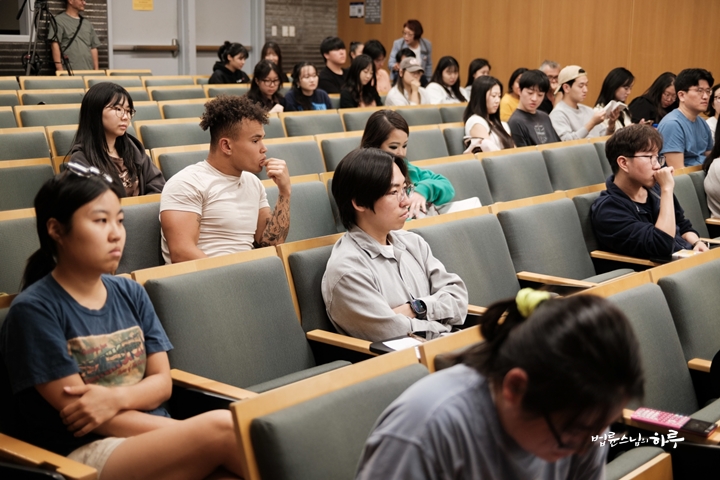
You can’t write your thesis because you’re trying to write it too well. Think about it. Right now, you don’t have the skills to write a good thesis. So first, just write it roughly. Then read it again and revise if it’s lacking. If your professor returns it, revise it again. This way, you can at least write something despite its shortcomings. Most people can’t get past the first page because they try to write too well from the start. If you write and erase, write and erase, you’ll still be in the same place after six months. It’s because you’re trying to write a good thesis without special skills. If you don’t have skills, just write according to your ability.
No matter how poorly you think you write, you write better than elementary school students and better than undergraduates. So just write. Things don’t work out because of greed. I didn’t go to university because I didn’t want psychological burden like you have. (Laughter) Since I don’t have to take exams or tests, I could study however I wanted. When you study because you enjoy it, your memory improves and learning becomes more effective.
You don’t need to force yourself to study. Are you really majoring in your field because you love that discipline? Are you studying because you’re really curious? Some of you probably aren’t. Most are probably doing it because you need the degree anyway. That’s why studying becomes psychological pressure. This can lead to worse results. The more you endure hardship, the more you damage your physical and mental health. If your parents send money, you’ll feel even more psychological pressure. Because when you can’t focus on studying, it feels like you’re betraying your parents.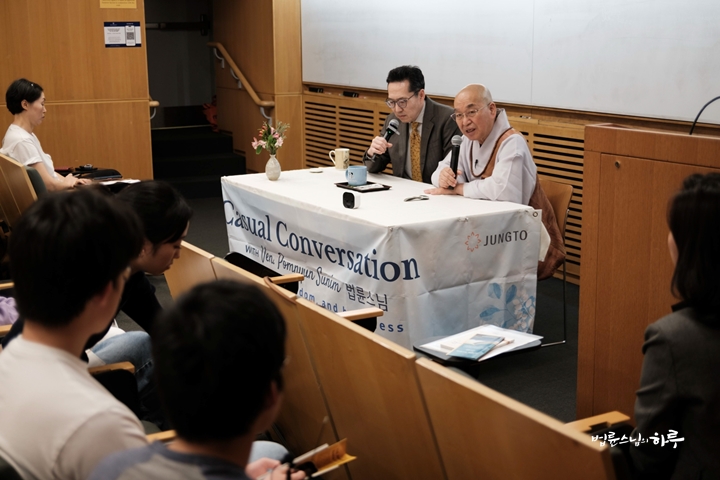
So just do it casually. When you have such a light attitude, classes can actually be more interesting. With curiosity and interest, concentration increases. When concentration increases, memory improves and creativity grows. Does this sound unrealistic? However, if you have high psychological pressure like the questioner, try changing your mindset based on what I’m saying.
Taking a ‘3-month break and then studying again’ doesn’t help at all. That’s just a 3-month grace period. If you want to study while taking a break, you should do manual labor during your break. Take a semester off and try manual labor somewhere. ‘Studying is hard, but this is even harder. Studying is better than this work.’ When you think this way, studying becomes easier. Just resting doesn’t help. That’s just temporary avoidance, and when you return, you’ll feel the same pressure again.”
“Thank you. I got it.”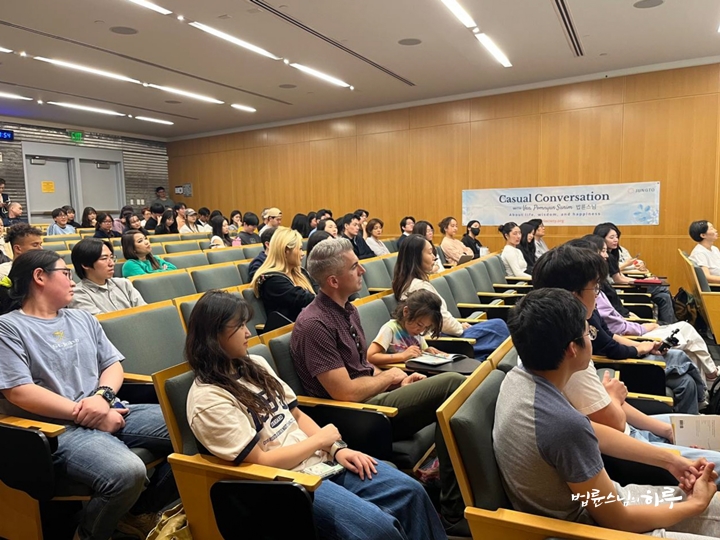
Questions continued to flow.
Most attendees were of Asian descent—Korean, Chinese, Vietnamese—though occasionally non-Asian students also participated. The lecture ran 10 minutes over schedule, lasting 1 hour and 40 minutes. Finally, Sunim offered words of encouragement to the students.
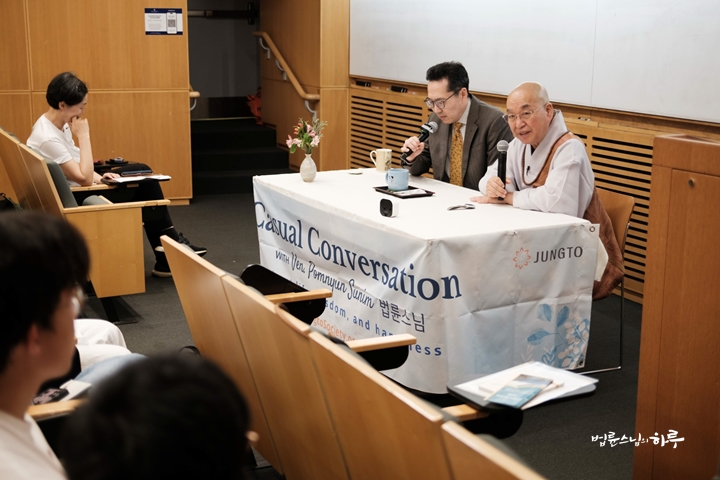
“I believe each and every one of your health and happiness is more important than degrees. Forcing yourself to study while overcoming suffering is not desirable. You are in good conditions to enjoy studying. If you want to both study and date, do both. Study together while dating. If you want to both study and drink, talk about your studies while drinking with friends. The important thing is that unless you completely give up studying, you shouldn’t stray from the purpose of studying. So put studying at the center and do other things alongside it.
Enjoy this time when you can just eat and study
Looking back, the period of studying is the golden age of life. This leisurely time in your life when you can just eat and study will not come again. Many people want to study but can’t because they have to earn money. But aren’t you all just eating and studying? (Laughter)
The reason I’m saying these somewhat forced words is because I hope you will study more joyfully. I farm with great joy. You should also study joyfully. If it’s not fun at all, you can quit. How can research that even I find uninteresting help the world? Even when I research things I’m extremely curious about and enjoy, people in the world often don’t pay much attention. So I hope you will study more lightly and joyfully.”
After finishing the lecture, they quickly cleaned up and took a commemorative photo with the volunteers.
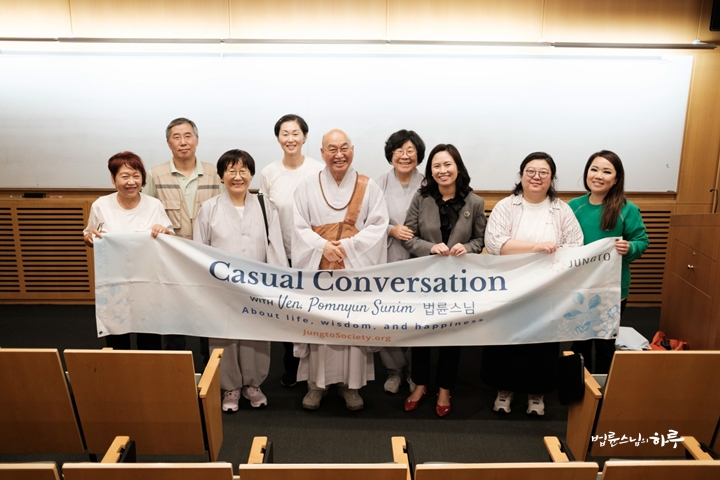
Then, Sunim presented his signed book as a gift to Professor Kim Soo-jung who had invited him, and took a commemorative photo with the professor’s family.
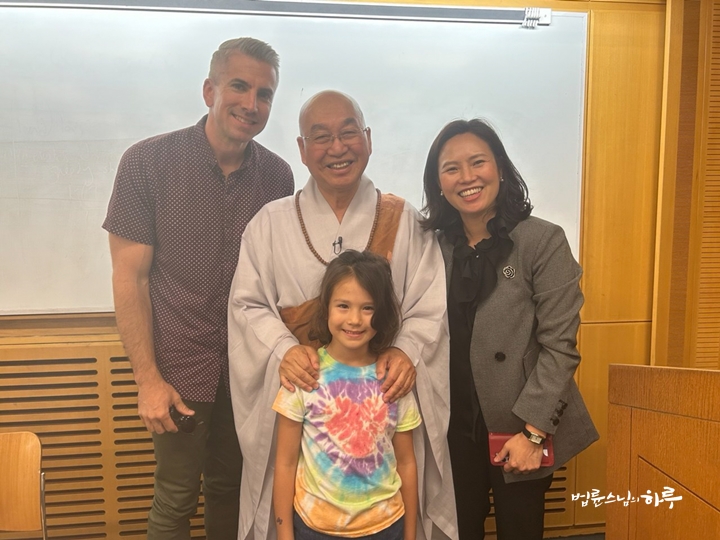
Subsequently, students formed a long line wanting to take photos with Sunim. In particular, siblings who came to study from Eastern Samoa wanted to take a photo with Sunim, and during their conversation, they mentioned that their mother watches Venerable Pomnyun’s YouTube videos every day and finds comfort in them, asking them to convey her gratitude to Sunim. Many students expressed their appreciation for Sunim coming all the way here.
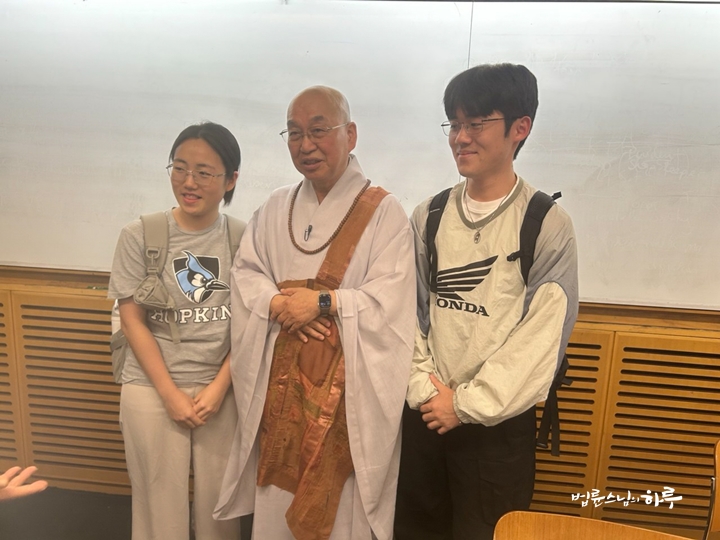
After leaving the lecture hall and returning to the Jungto Society center in America, it was 10 PM. Sunim had a simple dinner at the late hour, discussed tomorrow’s schedule, and concluded the day’s activities.
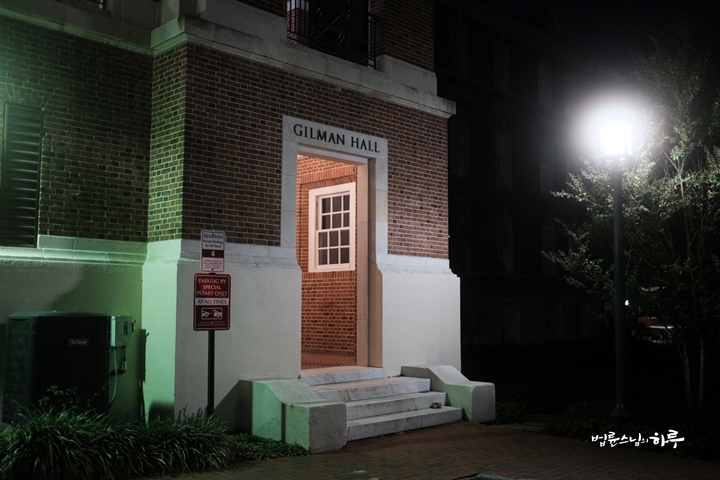
Tomorrow, he will depart from Washington D.C., fly to Chicago, and hold a Q&A lecture for Korean residents living in Chicago.





